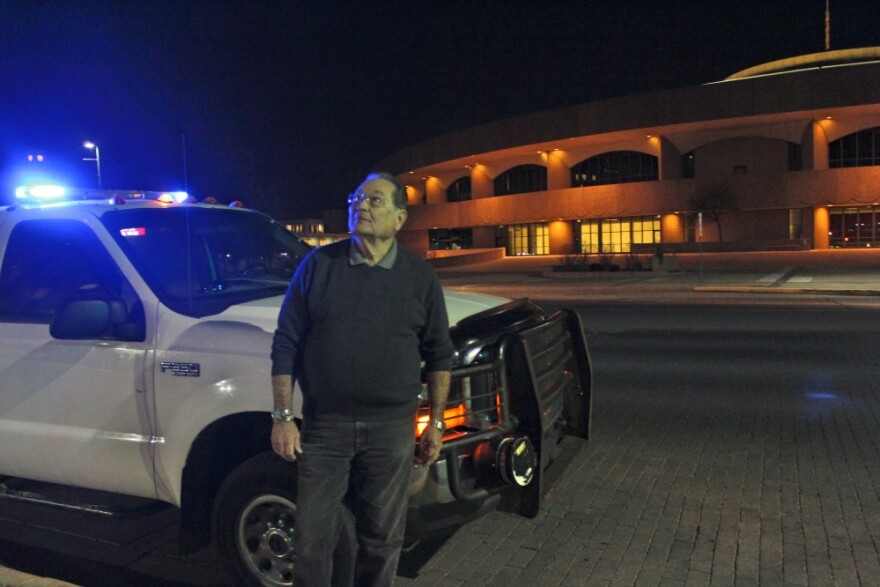Around this time every year, downtown Wichita is the preferred roosting spot for a certain large pest. Trees and tall buildings become flooded with black crows. To ward them off, a common deterrent can be heard in the form of a loud boom. KMUW’s Sean Sandefur reports on what’s being done to keep them away.

On a recent warm, winter day, the fountains are flowing at the Garvey Center in downtown Wichita. Among the leftover salt strewn across the sidewalk, are lots and lots of bird droppings.
Along a nearby side street, it gets much worse. Leaving out the details, the abundance is, well, unattractive. That's of concern to Jessie Griffith, property manager of the 250 Douglas Place and Corner 365 apartment complexes.
She describes the experience of showing potential clients around downtown.
“You can smell it, you’re walking across it, the birds are diving over you," Griffith says.
“They’ve been here before, but not like this," she says. "And they’re scaring off all the little birds. There used to be a lot of sparrows that would sing to you as you walked by.”
According to a report from Penn State, crows migrate from northern U.S. states and Canada in the fall, and for much of history, they would roost in the countryside. But it has became more and more common for these birds to make their homes in more urban settings, due to better lighting and warmth.
During the winter, they leave early in the morning to forage for food. They then return to communal roosts at sunset.
Roosts can be populated by thousands of birds at a time, which means a lot of bird droppings.
“It can be toxic to breathe if you have large quantities of that," Griffith says. "You can get sick from it.”

Griffith says she never imagined researching crows would be a part of her job, but, nevertheless, she's learned that if a crow roost becomes large enough and bird droppings are allowed to accumulate, parasites and bacteria can cause people to get sick.
That’s why the Garvey Center, and other downtown businesses, hire people each winter to scare the birds off and keep them from roosting in large numbers. One of those people is 70-year-old Cliff Varner.
Every evening, he cruises the area in his white pickup truck. Blasted over a PA system are the sounds of loud, shrieking crows, which help to scare real crows away from their roosts. It's a distress call, he explains.
Varner is retired from the Wichita Public School system, where he repaired electronics for many years. Since then, he’s been in the pest control business.
“I’m licensed and certified by the State of Kansas, I have been for 26 years,” he says.
That license is for Nuisance Wildlife Damage Control, which allows him to scare away, trap or kill a number of listed pests. He also has a license from the federal government that allows him to set off explosives.
Yes, explosives.
As Varner drives from street to street, he fires off a propane cannon that sits in the bed of his truck. When he does, hundreds of crows take off from trees and buildings and Varner watches where they go. He slowly herds the crows away from downtown.
Varner knows that it’s impossible to scare them away for good. Instead, he wants to keep large numbers of crows from roosting in a single place. He says the key is to be unpredictable.

“Sometimes I come in early, sometimes I come in late. The birds like to become accustomed to you if you go in at a certain time every day," he says. "If you use only a [single sound], such as distress calls, it’s not going to last long. The birds get accustomed to them.”
Each day when Varner begins, he calls the Wichita Police Department to notify them that he’s working, in case the city gets calls about gunshots or explosions—which does happen.
His abrasive tactics seem to be working—many of the streets Varner drives down have a lot of bird droppings, but the birds have since moved on to another part of town.
The results are limited to the areas where Varner is hired, and city officials don’t have a simple fix for the rest of downtown.
“Well, we don’t have a city-wide or a downtown-wide program," says Joe Pajor, the deputy director of Wichita’s Public Works and Utilities department. “When individual property owners have issues that they want to deal with, we refer them to licensed contractors that can provide assistance to try and scare the crows away, basically.”

The city itself has a loud cannon they use to keep crows from roosting at city hall. Pajor says they move it around on a regular basis to keep crows away from the top of buildings, trees and the parking lot.
“So several times in the evening and overnight, we’ll have that set off by maintenance staff,” he says.
Pajor says the city will clean up bird droppings when they’re on city property, but there’s not much else they can offer. He says it’s a persistent problem not only with crows, but with also with pigeons.
The crow problem does slow during mating season. The birds are very communal during the fall and winter, but during spring, they pair off and the problem of large roosts tends to go away.
Until then, Cliff Varner and others will try and keep them on the run.
--
Follow Sean Sandefur on Twitter @SeanSandefur.
To contact KMUW News or to send in a news tip, reach us at news@kmuw.org.



